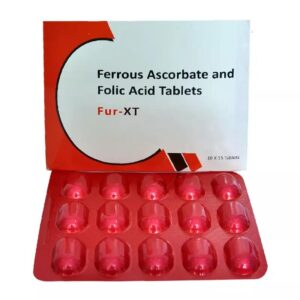FOLIC ACID + ELEMENTAL IRON + NOT AVAILABLE
Folic Acid: Folic acid, also known as vitamin B9, is a synthetic form of the water-soluble vitamin folate. It is an essential nutrient required for the synthesis and maintenance of DNA and RNA, as well as for cell division and growth. Folic acid is primarily used as a supplement to treat or prevent folate deficiency.
The main mechanism of action of folic acid is its conversion into its active form, tetrahydrofolate (THF). THF plays a crucial role in the transfer of one-carbon units, which are necessary for the synthesis of nucleic acids and certain amino acids. By providing the body with an adequate supply of folic acid, it ensures the normal functioning of these essential biological processes.
The recommended dose of folic acid varies depending on the specific use. For preventing neural tube defects during pregnancy, the typical dose is 400-800 micrograms per day. It is also commonly prescribed for individuals with folate deficiencies, such as those with malabsorption disorders or certain medications that interfere with folate metabolism. In such cases, higher doses may be recommended.
Folic acid is generally well-tolerated, and serious side effects are rare when taken within the recommended dosage range. However, some individuals may experience minor side effects such as nausea, abdominal cramps, diarrhea, and bloating. These effects are usually temporary and diminish with continued use. High doses of folic acid (more than 5,000 micrograms per day) can occasionally cause more severe side effects such as skin reactions, sleep disturbances, and seizures, although these instances are rare.
It is important to note that folic acid supplementation may mask the symptoms of vitamin B12 deficiency. Therefore, individuals with underlying B12 deficiency should consult their healthcare provider before initiating folic acid therapy. Additionally, individuals undergoing chemotherapy or with certain forms of cancer should consult their healthcare provider before taking folic acid supplements, as higher levels of folic acid may interfere with the effectiveness of the treatment.
Overall, folic acid is a vital nutrient for maintaining healthy cellular function, particularly in the synthesis and repair of DNA and RNA. It is widely available over-the-counter and is commonly recommended for pregnant women, individuals with folate deficiency, and those at risk of certain birth defects. It is essential to follow the recommended dosage and consult a healthcare professional for personalized advice.
Elemental Iron: Elemental Iron is a medication that is commonly used to treat iron deficiency anemia. Iron deficiency occurs when the body does not have enough iron to produce sufficient hemoglobin, a protein in red blood cells that carries oxygen to various tissues and organs. Elemental Iron supplements can help increase iron levels in the body and restore optimal hemoglobin production.
The mechanism of action of Elemental Iron is quite simple. It provides the body with additional iron, which is essential for the synthesis of hemoglobin. Hemoglobin enables red blood cells to transport oxygen from the lungs to other parts of the body. Thus, by supplementing iron, Elemental Iron helps increase the production of hemoglobin and improve oxygen-carrying capacity.
The appropriate dosage of Elemental Iron depends on the severity of the iron deficiency and the individual’s age and overall health. Generally, the recommended daily dose ranges from 100-200 mg for adults. It is important to follow the instructions provided by a healthcare professional or as mentioned on the product packaging.
While Elemental Iron is generally well-tolerated, there can be some side effects associated with its use. Common side effects may include constipation, diarrhea, nausea, vomiting, stomach cramps, and dark-colored stools. These side effects are usually mild and temporary. In some cases, individuals may experience allergic reactions such as rash, itching, or swelling, which require immediate medical attention.
It is worth mentioning that Elemental Iron may interact with certain medications, such as antibiotics, antacids, and thyroid medications. Therefore, it is essential to inform your healthcare provider about any ongoing medications or medical conditions before starting Elemental Iron.
Overall, Elemental Iron is a crucial medication for the treatment of iron deficiency anemia. It works by providing the body with the necessary iron to produce hemoglobin, thereby improving oxygen-carrying capacity. However, it is important to use Elemental Iron under the guidance of a healthcare professional and be aware of potential side effects or interactions with other medications.
Not Available: I’m sorry, but without a specific drug name, I cannot provide a detailed description, as “Not Available” is not a specific drug. If you have a particular drug in mind, please provide the name and I’ll be happy to provide the requested information.

